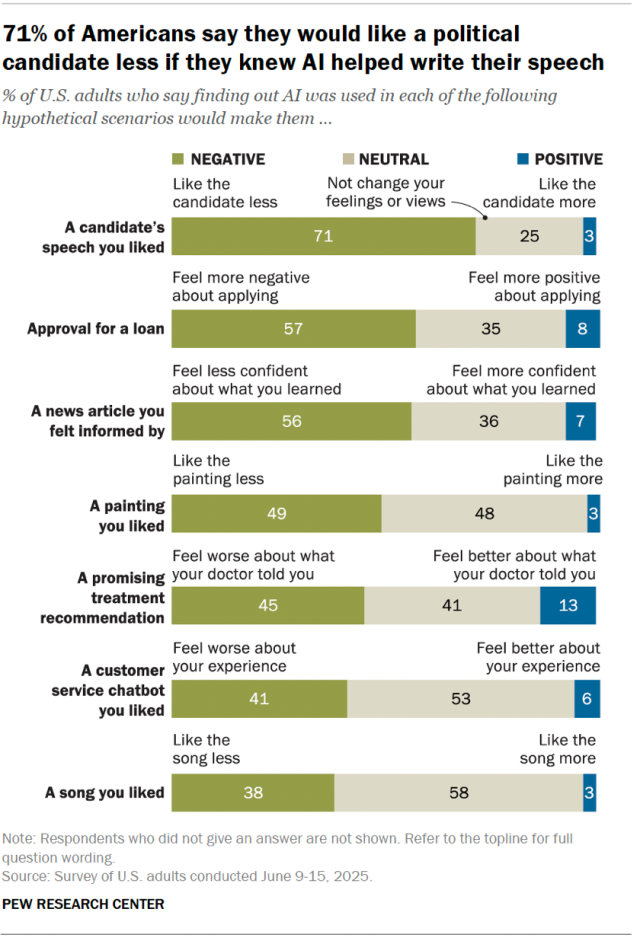
Artificial intelligence is now embedded in society in ways that many people aren’t aware of, and most Americans don’t have much confidence in their ability to detect AI-produced content.
In a new survey, Pew Research Center asked U.S. adults how they would react to seven hypothetical scenarios where they learned – after the fact – that AI was involved in tasks traditionally handled by humans.
The survey asked about the use of AI in scenarios ranging from political speeches to news articles to paintings and songs. We asked respondents whether finding out later that AI was used in each scenario would make them feel more positive, more negative or not change their views about the interaction. In the case of AI-generated paintings, for example, we asked the following question:
Imagine you see a painting you really like. Later, you find out the painting was made by artificial intelligence. Would finding out that the painting was made by artificial intelligence make you like the painting more, like the painting less or not change your views?
Responses to all seven scenarios lean more negative than positive. But many Americans don’t express an opinion in either direction, with sizable shares saying their view would not change if they learned that AI was used in various settings.
Americans are more critical of certain AI uses than others

Americans had the most negative reaction to a scenario where they learned that a political candidate had used AI to help write a speech they liked. In this hypothetical situation, 71% of adults say they would like the candidate less, 3% say they would like the candidate more and 25% say their view of the candidate would not change.
More than half of Americans (56%) would also react negatively if they learned that AI was used to write a news article they felt informed by, while 7% would like the article more and 36% say it would not change their views.
These two findings align with previous Center research showing that Americans generally take a dim view of AI in politics and journalism.
When it comes to the use of AI in the arts, the public’s attitudes are more mixed:
- If Americans learned that a painting they liked was made by AI, 49% say they’d like it less. But a nearly identical share (48%) say their views would not change.
- If they learned that a song they liked was created by AI, 38% say they would like it less. But a majority (58%) say it would not change their opinion of the song.
Three other scenarios in the survey asked about AI providing support or making decisions that directly affect people:
- A majority of Americans (57%) say they would feel more negative about applying for a loan if they later found out that AI would be used to decide whether they get the loan or not. Another 35% say they would not feel differently.
- 45% of adults say they’d feel worse about a doctor’s promising treatment if they later learned it had been recommended by AI. A similar share (41%) say their views would not change. This was the scenario that had the largest share of Americans (13%) saying they’d feel better about the situation after learning about AI’s role.
- 41% say they would feel worse about a customer service experience if they later realized they were talking with an AI chatbot. A larger share (53%) say their views wouldn’t change in this scenario.
Differences by age
Younger Americans are far more likely than older Americans to have a negative reaction to finding out that a song or a painting was done by AI and not a human:
- 66% of adults under 30 say they would like a painting less if they found out it was done by AI. This compares with 36% of Americans 65 and older.
- 53% of adults under 30 say they would like a song less if they found out it was written by AI. This compares with 26% of those 65 and older.
Differences by race and ethnicity
White adults are more likely than Hispanic and Black adults to say they’d have a negative reaction to an AI-generated painting. More than half of White adults (54%) say they’d react negatively in this situation, compared with 40% of Hispanic adults and 34% of Black adults. Among Asian adults, 49% expressed a negative view.
White adults (62%) are also more likely than Hispanic (44%), Black (42%) and Asian (51%) adults to say they’d react negatively to finding out that an informative news article had been written by AI.
Note: Here are the questions used for this analysis, the topline and the survey methodology.

